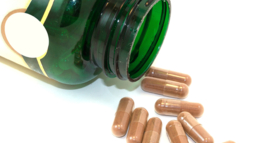 Food state supplements: superior, or marketing term?
Food state supplements: superior, or marketing term?
Posted on Mon, 11 Jun 18

The term ‘food state’ is being used to claim that certain food supplements are superior to other products, but is there any truth to the marketing claims?
A few dietary supplement brands are claiming that their ‘Food State’ (aka ‘Food Grown’, ‘Food Sourced’ or ‘Wholefood’) products have superior absorption, efficacy and safety due to unique manufacturing processes in which ‘synthetic’ vitamins and minerals are rendered more ‘natural.’ Using the example of vitamin C, let’s explore whether these claims are substantiated.
Reviewing three ‘food state’ products from three different brands in the United Kingdom, the product labels stated that each capsule provides from 175 to 250 mg of vitamin C in addition to 80 to 100 mg of citrus bioflavonoids. The ingredients list declared ‘vitamin C’ and ‘citrus bioflavonoids’ or ‘citrus pulp.’
Two brands claimed that their ‘food state’ products also contain a range of other nutrients such as vitamins, amino acids and other factors, but do not measure these with laboratory tests so we cannot be certain how much is in each capsule, or if they are present at all.
A study was provided as evidence of better absorption. In the study, 500 mg of ascorbic acid (vitamin C) was mixed (with no special manufacturing process) in 2000 mg of citrus extract providing 390 mg of bioflavonoids, administered in sugar sweetened water, and found to be better absorbed than vitamin C alone [1].
One problem with this study is that in the 30 years since its publication it has never been replicated, on the contrary 17 clinical studies have found no difference between absorption of pure vitamin C and vitamin C naturally occurring in food, vitamin C with bioflavonoids, or vitamin C with bioflavonoid-rich fruit juices [2].
Another problem is that no products replicated the amounts or ratios of vitamin C, citrus extract or bioflavonoids used in the study, so it’s a stretch to say they are equivalent or might have equivalent effects.
Claims of enhanced absorption, therefore, are not supported.
Consequently, the claim that a ‘lower dose is required’ is also not supported.
One brand implied there is an alteration in vitamin C during their manufacturing process to a unique ‘glycoprotein bound’ ‘food state.’ However, vitamin C (l-ascorbic acid) in food and supplements is chemically identical and the characterization of a unique protein-bound form of vitamin C in these products, or food, does not exist. This claim is marketing masquerading as science.
To prove that these products are more effective and safer would require comparative efficacy and safety studies, but these do not exist either. Differences in efficacy and safety are implausible given the lack of evidence for any unique features of these products and the excellent safety profile of vitamin C.
Although it was suggested that ‘food state’ products were more ‘natural’ than ‘synthetic’ vitamins there was no demonstrable difference to any other product providing vitamin C and bioflavonoids, other than in the way in which they were marketed.
References:
- Vinson JA, Bose P. Comparative bioavailability to humans of ascorbic acid alone or in a citrus extract. Am J Clin Nutr. 1988 Sep;48(3):601-4
- Carr AC, Vissers MC. Synthetic or food-derived vitamin C--are they equally bioavailable? Nutrients. 2013 Oct 28;5(11):4284-304.
Tags: Dietary Supplements, Vitamin C




